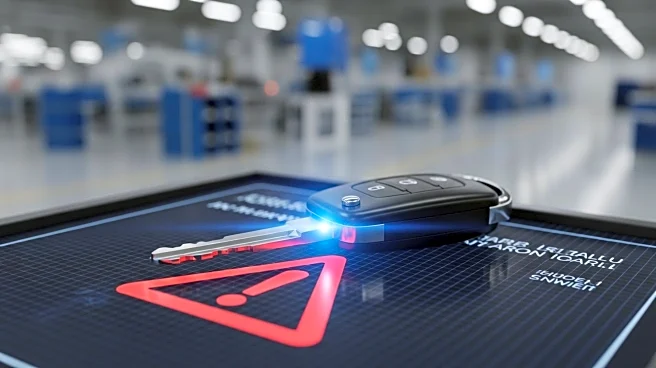What's Happening?
Jaguar Land Rover (JLR), the UK's largest car manufacturer, has instructed its factory staff to remain at home until at least next Tuesday following a cyber-attack that has severely disrupted its operations. The attack has led to a halt in production at JLR's facilities in Merseyside and the West Midlands, including its engine manufacturing site in Wolverhampton. The breach was discovered on Sunday, prompting the company to shut down its systems to mitigate the impact. Although there is no evidence of customer data being compromised, the disruption has affected sales and repairs, with thousands of customers awaiting new vehicles and dealerships unable to order parts online. The attack comes at a critical time, coinciding with the release of new registration plates in the UK. A group of hackers, linked to previous retail sector attacks, has claimed responsibility for the breach.
Why It's Important?
The cyber-attack on Jaguar Land Rover highlights the growing vulnerability of major industrial operations to digital threats. This incident not only disrupts JLR's production but also impacts the broader automotive industry, which is already facing challenges such as US tariffs and weak consumer confidence. The halt in production affects thousands of workers and delays vehicle deliveries, potentially leading to financial losses for the company and its stakeholders. The attack underscores the need for robust cybersecurity measures in the manufacturing sector, as similar incidents have previously affected other major retailers like Marks & Spencer and Harrods, costing millions in lost sales.
What's Next?
Jaguar Land Rover is currently investigating the claims made by the hackers and working towards resolving the cyber-attack. The company aims to restore its systems and resume production as soon as possible, although the timeline remains uncertain. Stakeholders, including employees, customers, and industry partners, are likely to monitor the situation closely, anticipating updates on the resolution of the breach. The incident may prompt JLR and other manufacturers to enhance their cybersecurity protocols to prevent future attacks.
Beyond the Headlines
The cyber-attack on Jaguar Land Rover may lead to broader discussions on the ethical and legal responsibilities of companies in safeguarding their digital infrastructure. As cyber threats become more sophisticated, industries may need to invest in advanced security technologies and collaborate with cybersecurity experts to protect sensitive data and operations. This incident could also influence regulatory policies, pushing for stricter cybersecurity standards across the manufacturing sector.











